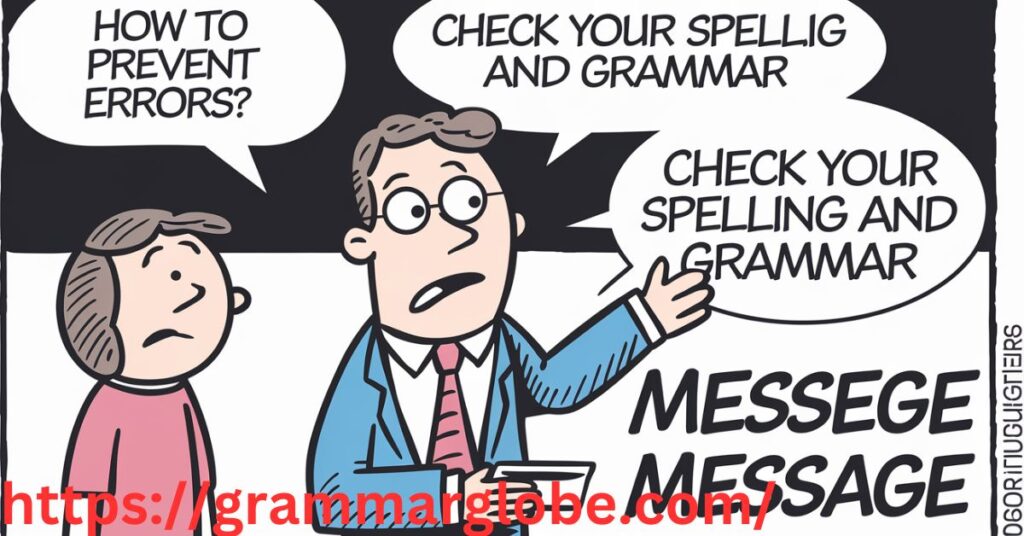Mistyping words is a common problem, and one frequent culprit is the confusion between “messege” and “message.” While “messege” is a misspelling, “message” is the correct form, referring to information conveyed through speech, writing, or electronic communication.
This error often arises due to the similarity in pronunciation and the tendency for typing mistakes when rushing. For example, someone might quickly text, “Did you get my messege?” instead of the proper, “Did you get my message?” Though small, such errors can affect clarity and professionalism, especially in formal communication.
To avoid this mistake, focus on pronunciation. “Message” has a soft “a,” not an “e” sound in the middle. Additionally, use tools like spell-checkers, which flag “messege” instantly, or practice writing it correctly in everyday contexts.
Correct spelling not only improves readability but also reflects attention to detail—an essential skill in professional and academic settings. By mastering “message,” you can communicate with confidence and avoid potential misunderstandings caused by minor errors.
What Is the Correct Spelling: “Messege” or “Message”?

The correct spelling is “message”. It is a widely used word in English, referring to information communicated from one person to another. The incorrect version, “messege”, is a typographical or phonetic error that has no official place in English.
- The correct spelling is “message,” not “messege.”
- “Message” refers to information conveyed through speech, writing, or electronic communication.
- “Messege” is a common misspelling due to typographical errors or confusion with similar-sounding words.
- To avoid this mistake, focus on the correct pronunciation, which includes a soft “a” sound.
- Always proofread your writing or use a spell-check tool to catch such errors.
Definition of “Message”
A message is defined as:
“A piece of communication conveyed through speech, writing, or an electronic medium.”
Correct Usage Example
“I left you a message about the meeting time.”
Incorrect Usage Example
“I left you a messege about the meeting time.”
The difference may seem small, but spelling errors like this can erode credibility, especially in professional communication.
Why Does “Messege” Appear So Often?

To understand the common occurrence of “messege,” let’s examine the underlying causes.
Phonetic Confusion
The way we pronounce “message” often misleads people. The soft “s” sound can trick individuals into thinking there’s an extra “e” in the spelling.
- Example: “messege” sounds closer to the pronunciation for some speakers, leading to mistakes.
Typing Errors
Typing quickly often results in small, unnoticed errors, like switching the positions of letters or adding an extra vowel.
- Quote: “When you’re in a rush, accuracy tends to suffer.”
Autocorrect Problems
- “Misinterpretation of Words”: Autocorrect may change words like “messege” to “massage” instead of the correct “message.”
- “Context Overlooked”: Autocorrect algorithms often prioritize “frequently used words,” ignoring the “context” of the sentence.
- “Unwanted Replacements”: Sometimes, autocorrect replaces a word with an “unrelated suggestion,” leading to confusion or miscommunication.
- “Professional Impact”: Autocorrect errors in emails or reports can undermine “professionalism” and clarity.
Psychological Tendencies
Studies have shown that our brains often overlook minor errors in familiar words.
- Quote: “Your brain knows what you meant to write, so it ‘fixes’ the mistake in your mind.”
The Impact of Spelling Errors on Professionalism
Misspelling words like message can significantly affect how others perceive your work. Below, we explore these impacts with examples.
| Impact | Description | Example |
|---|---|---|
| Decreased Credibility | Spelling mistakes can undermine the perception of competence and accuracy. | Misspelling “message” as “messege” in a formal email may cause doubts about your attention to detail. |
| Reduced Trust | Frequent errors in written communication can erode trust in your professionalism. | A typo in a business proposal may make clients question your reliability. |
| Poor First Impressions | Spelling errors, especially in resumes or cover letters, can leave a negative first impression. | A CV with multiple spelling mistakes may lead hiring managers to doubt your qualifications. |
| Missed Opportunities | Professional opportunities may be lost if your communication is perceived as unprofessional. | A typo in an important report could result in missed chances for promotion or recognition. |
| Increased Time for Correction | Spelling errors require additional time for revision, affecting productivity. | Having to go back and correct repeated spelling errors in a document delays project timelines. |
| Weakened Professional Image | Spelling errors can damage the polished and polished image you want to project. | Inconsistent spelling in marketing materials can make a brand appear unprofessional and less trustworthy. |
Quote:
“Details matter. Misspelled words can make even the most brilliant ideas look sloppy.”
Preventing Errors: How to Avoid Writing “Messege” Instead of “Message”

To ensure your writing remains error-free, follow these practical tips:
Proofread Your Writing
Even a quick scan of your text can catch minor mistakes. Tools can help, but nothing beats a careful manual review.
“Proofreading is the final step to polished communication.”
Use Digital Tools
Modern tools like Grammarly and spell-checkers in Word or Google Docs highlight and correct errors in real time.
| Tool | Purpose | Example |
|---|---|---|
| Grammarly | Checks spelling, grammar, and clarity. | Identifies messege and suggests message. |
| MS Word | Offers built-in spell-check functionality. | Flags misspellings during typing. |
| Google Docs | Highlights typos in documents. | Includes collaborative proofreading features. |
Practice Commonly Confused Words
Keep a personal list of frequently misspelled words like “message” and revisit them periodically.
- Examples:
- “Message” vs. “Messege”
- “Receive” vs. “Recieve”
- “Separate” vs. “Seperate”
Slow Down While Typing
Fast typing often results in avoidable errors. Taking a slightly slower pace can improve accuracy.
Common Misspellings and Their Fixes
Here’s a quick table highlighting common spelling errors, including “messege”:
| Incorrect Spelling | Correct Spelling | Why the Mistake Happens |
|---|---|---|
| Messege | Message | Phonetic confusion or typing error. |
| Definately | Definitely | Misinterpretation of the silent “i.” |
| Occured | Occurred | Skipping one of the doubled letters. |
| Seperate | Separate | Incorrect assumption about vowel placement. |
| Recieve | Receive | Misapplication of the “i before e” rule. |
The Role of Tools in Avoiding Mistakes

Technology plays a vital role in catching and correcting spelling errors. However, it’s crucial to use these tools effectively.
Autocorrect Advantages and Limitations
- Advantage: Catches simple errors like “messege” immediately.
- Limitation: If “messege” is added to your custom dictionary, autocorrect won’t flag it.
Quote:
“Autocorrect is your best friend, but only if you feed it the right data.”
Proofreading Tools
“Proofreading tools” are essential for creating error-free and polished content. Tools like “Grammarly,” “ProWritingAid,” and “Hemingway Editor” identify “spelling,” “grammar,” and “style” issues with remarkable accuracy. They provide “real-time suggestions” to enhance clarity and readability. Advanced features, such as “tone detection” and “readability scores,” help tailor your writing to your audience. These tools are invaluable for emails, essays, or professional reports. Using “proofreading tools” ensures your communication is precise, polished, and impactful.
Conclusion:
Spelling mistakes like confusing “messege” with “message” may seem trivial, but they can leave a lasting impression on your communication. While “messege” is simply a misspelling, “message” is the correct term for conveying information, whether through text, email, or spoken words. Understanding and practicing proper spelling ensures clarity and professionalism.
To avoid such errors, it’s essential to develop good habits. Slow down when typing and proofread your messages, especially in formal contexts. Take advantage of tools like spell-checkers and grammar software, which instantly highlight mistakes. If you’re unsure, refer to trusted dictionaries or language resources.
Remember, small improvements in spelling can significantly impact how others perceive your attention to detail. For instance, in a professional email, writing “message” correctly signals that you care about precision, while “messege” may appear careless or rushed.
Ultimately, language is a tool that shapes how we connect and collaborate with others. By consistently using the correct spelling, you strengthen your communication skills and build credibility in both personal and professional interactions. Let this serve as a reminder that even the smallest errors can be easily avoided with mindfulness and practice. So, embrace the right way—”message”—and leave “messege” behind for good!
FAQs
What is the correct spelling?
The correct spelling is “message,” not “messege.”
Why do people spell it as “message”?
It’s often a result of typing errors or mispronunciation.
What does “message” mean?
It refers to information conveyed through speech, writing, or digital communication.
Is “messege” ever correct?
No, “messege” is a misspelling and has no valid usage.
How can I avoid this mistake?
Proofread your writing and use tools like spell-checkers.
Does autocorrect fix “message”?
Most autocorrect systems recognize “messege” as incorrect and suggest “message.”
Can a spell-checker always catch “message”?
Yes, most spell-checkers will flag it as an error.
Does pronunciation help in spelling “message”?
Yes, focusing on the soft “a” sound can prevent mistakes.
What tools can help with spelling?
Grammarly, ProWritingAid, and Microsoft Word are reliable options.
Is “message” spelled differently in British English?
No, the spelling is the same in both American and British English.

Irha Queen, a talented writer at grammarglobe.com, specializes in crafting witty puns and exploring the intricacies of English grammar. Her playful yet informative style makes language learning fun, blending humor with clear explanations to engage readers of all levels. Whether she’s spinning clever wordplay or breaking down complex grammar rules, Irha’s content is both entertaining and educational, making her a favorite among language enthusiasts.







